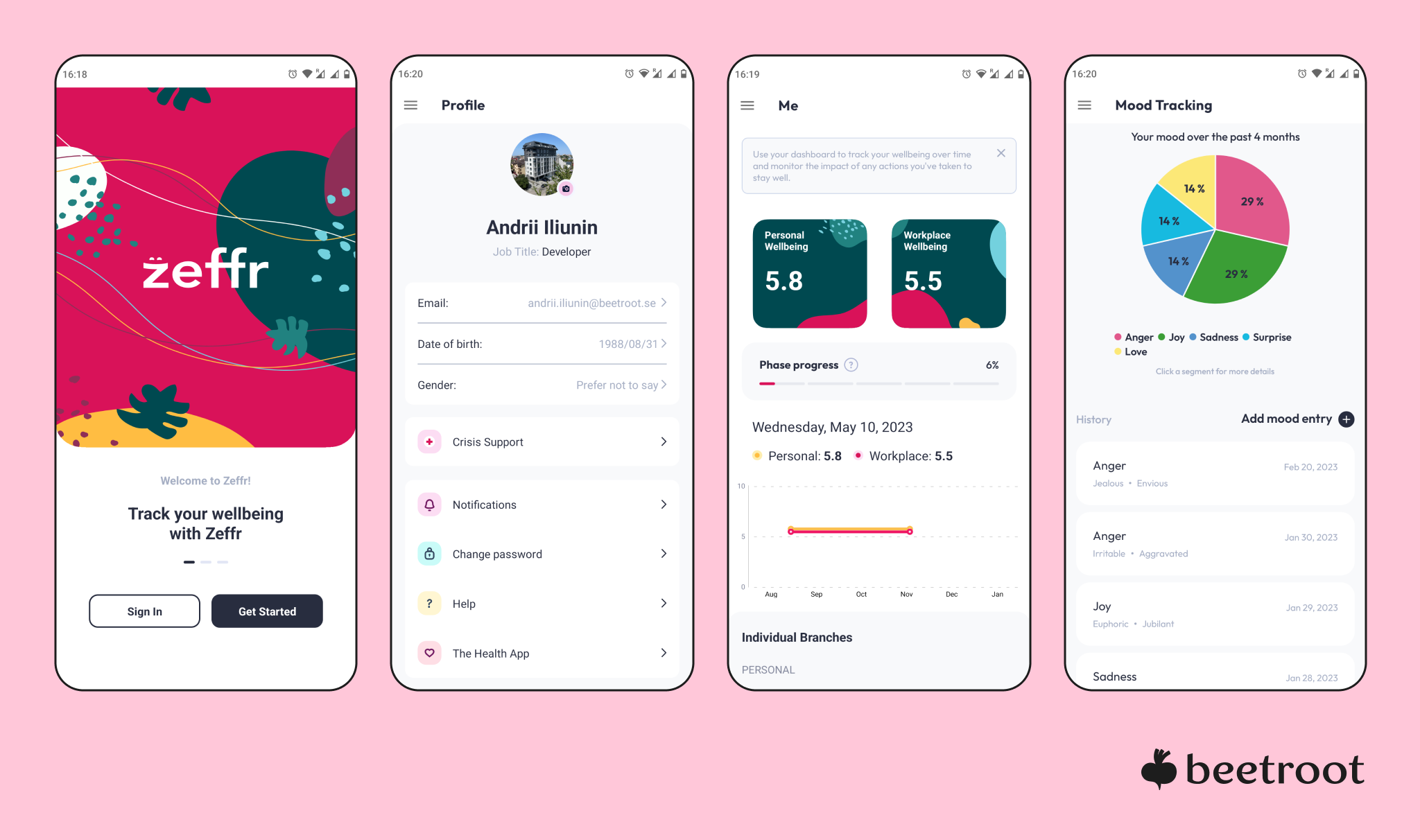
Building a Strong Native App Development Team for Healthcare Apps like Zeffr
Contents
Contents
In 2023, result-oriented communication, collaboration, and clearly defined areas of responsibility are no longer sufficient to secure high-performing teams. For sure, they are still a must. However, care for employees’ mental and physical well-being has unlocked a new opportunity for businesses to become even more productive. And Zeffr is just the tool to help them with this task.
This app helps organizations build happier and, thus, better-performing teams, all by understanding and addressing their health and general well-being needs. Zeffr gathers data about users’ states through chatbot-based surveys, enables mood tracking, and suggests improvements by analyzing this data.
On top of that, the app offers a rich navigable content library with numerous articles, podcasts, topic collections, and more to help users explore opportunities for improving key areas of their personal and work-related well-being. Last but not least, Zeffr encourages organizations to join in and put more effort into creating better, healthier workplaces.
As devoted ambassadors of sustainable work environments and passionate burnout fighters, the Beets couldn’t be more excited to work on such an impactful project. In this article, we share our experience building a native app development team for Zeffr and formulate some essential factors to consider when answering the ultimate question of how to build a successful mobile app development team for any healthtech project.
Understand the Initial Challenge and Look Beyond
Building a mobile application is a costly and high-stakes investment, regardless of whether you work with an in-house team or outsource the project to a third party.
What is more, it can be pretty stressful. After all, the app is the client’s brainchild they are most likely putting high hopes on. Therefore, the numerous concerns mobile app development is accompanied by are entirely justified.
With healthtech projects, it can get even more complicated. Software development in this industry usually involves multiple challenges connected to compliance with data security regulations, legacy systems integration, ensuring data accuracy, and more.
So, what is the ideal development team for mobile app development for a healthtech product? Naturally, the specialists working on the project must have relevant experience and expertise in the field. However, that’s not all.
If you decide to engage a tech partner in development, ensuring the company is more than just a technical contractor with experience in the field is essential. Therefore, gaining references regarding the potential partner’s attitude makes sense. For example, do they get pain points specific to your industry? Are they proactive? What capability do they own to solve non-standard problems and project changes along the course?
As a software development company, Beetroot focuses on building products that make an impact, including Climate Tech, EdTech, and HealthTech. Hence, when our previous customers approached us with the Zeffr project, we knew it would be a perfect match.
The initial task for the Beetroot mobile app development team included the following:
- Collect and transmit the health data once a day according to the metrics the user selects, filling in the missed period of using the app.
- Create fluent, satisfying, and feature-rich UI of the chatbot used for surveys.
- Provide detailed charts functionality essential for displaying health indicators and tracking user progress.
- Ensure deep links and push notifications support.

Ensure Your Native Mobile App Development Team is Flexible
Often, the team composition requirements change throughout the life cycle of software development projects.
So, there is no perfect mobile app development team structure. Instead, the task of your CTO or your outsourced tech provider is to ensure the mobile app development expert team can respond to the changes related to the project stage, scope, timeline, and budget, as well as user feedback and ever-changing market conditions.
Flexibility is one of the core things to expect from collaborating with Beetroot. It means we can quickly assemble and adjust the team of tech experts depending on the up-to-date requirements. As a result, clients get access to cross-functional expertise without retaining specialists needed for just one or two development phases. Additionally, such an approach stimulates transparent communication and collaborative culture between all parties involved, leading to better product performance.
Building Zeffr involved creating two applications with native frameworks: one for iOS using Swift programming language and one for Android written in Kotlin. In addition, the apps have distribution automation for both QA and production environments.
Naturally, at different stages of Zaffr’s development, the team composition changed to adjust to the client’s requirements. Overall, we engaged a variable team of the following specialists:
- Up to two iOS developers
- Up to two Android developers
- One QA manual on a full-time and part-time basis, depending on the project stage
- One part-time project manager
- One tech lead on a part-time basis.
Plan for Adjustments and Manage Costs
The more meticulous the pre-development planning is, the fewer mid-project changes and, thus, additional expenses in the future. However, app development is a dynamic and sometimes rocky process where change is inevitable. The project requirements, scope, and priorities may change in response to various internal and external factors, including market shifts or user feedback after the initial launch.
Therefore, we suggest planning for adjustments and cost management with your in-house team, the outsourced team, and the stakeholders. It entails establishing a straightforward change management process, accurately estimating costs, transparently discussing budget issues, continuously monitoring project progress, and reevaluating priorities.
All this will help you avoid missed deadlines, budget overruns, and, most importantly, disappointing project results. And once again, this is where you must ensure your software development partner is flexible.
With the Zeffr project, the scale and workload changed throughout the development course. And we changed the pricing model accordingly, working under the Time-and-Materials agreement when the project started and then switching to a fixed monthly budget in the next six months of work. As a result, the total monthly cost of the product reached $12,000 /mo with a core development duration of 13 months.

Measure Results and Continuously Improve
Even before the development begins, it’s essential to determine the metrics and tools for performance measuring. The reason is simple: constantly monitoring the project helps keep it on track to achieving set objectives and highlighting areas for improvement, allowing the team to adjust the strategy.
The metrics for measuring an app’s performance usually include response and load time, crash rates, user engagement, retention rates, etc. In telehealth, it’s also essential to regularly solicit and address user feedback, ensuring the product you’re building is genuinely impactful and helps to improve health outcomes.
Finally, monitoring results and exploring opportunities for improvement nurtures a culture of innovation, continuous learning, and genuine commitment to the project, all of which contributes to a long-term productive partnership with your native mobile development team.
The major results of the Zeffr app’s core development stage include the following:
- Completely stable application operation
- Zero crashes on production since the project delivery
- All user feedback was processed and addressed.
- Implementation of some complex features and application behavior improvements
- Low regression levels, all the instances of which were identified by the QA team and subsequently fixed
- Support of all the latest updates of the Android and iOS platforms
The project has now entered the ongoing maintenance phase, with our team remaining there for the client’s development ideas and requests.
Throughout developing Zeffr, our team also gained invaluable learnings and insights. The Android and iOS mobile app development teams increased their expertise and deepened their experience in charting development. Moreover, we’ve perfected our crisis management skills since we had to establish an effective workflow and build the app under war conditions.
But one of the most important insights of this project is that dedication, hard work, and an impact-driven approach pay off since we got to work on Zeffr due to successful cooperation with the same client in the past. Though the implementation phase is over, we continue supporting the project and are preparing for new activities the following year.
Pay Attention to Team Growth and Development
A high-performing team is continuously motivated, engaged, and encouraged to learn and think outside the box. That is why we always suggest fostering a culture of team growth by ensuring educational and career development opportunities, promoting collaboration between team members, and offering our team members learning opportunities through challenging tasks.
For example, after working on the Zeffr app, the Android and iOS mobile app development teams increased their expertise and deepened their experience in charting development. Two of our junior developers and a QA engineer grew to the middle level.
Moreover, our native mobile app development team perfected its crisis management skills since most developers were in Ukraine, so we had to establish an effective workflow and build the app under war conditions.
But one of the most important insights of this project is that dedication, hard work, and an impact-driven approach pay off since we got to work on Zeffr due to successful cooperation with the same client in the past.
Create Synergy
The above factors could be summarized as a single notion: successful products are created when all parties involved are 100% dedicated, flexible, and aligned regarding the work approach and fundamental values.
As an impact-oriented software development company, we take pride in working with like-minded organizations such as Zeffr and get genuinely invested in making an impact together. Our experience proves that it’s one of the indispensable keys to building a product that can thrive.
If you feel like taking your healthtech mobile app to the next level, don’t hesitate to reach out, and we’ll be happy to talk you through the process based on your needs and objectives.
Subscribe to blog updates
Get the best new articles in your inbox. Get the lastest content first.
Recent articles from our magazine
Contact Us
Find out how we can help extend your tech team for sustainable growth.






